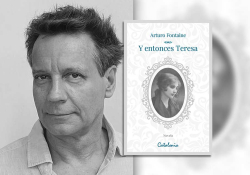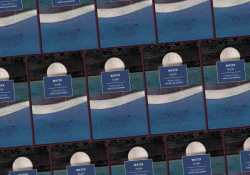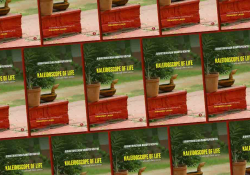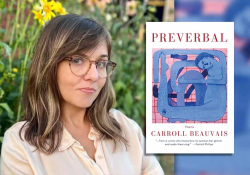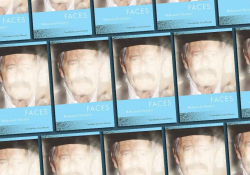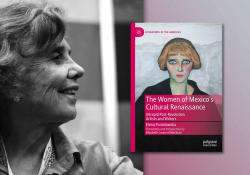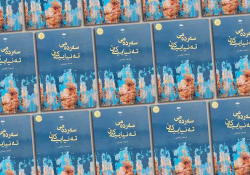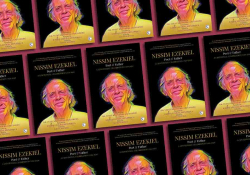Somnolent Souls Dreaming of Eternity: The Poetry of Alexander Veytsman
 As a reviewer who is fluent in both English and Russian, I approach the reading of such works as Alexander Veytsman’s «Демография дремлющих душ» / A Succession of Somnolent Souls (Im Press/M-Graphics, 2022), translated by Laurence Bogoslaw, as if in stereo, considering the Russian original and the English translation as independent, but related, works of poetry.
As a reviewer who is fluent in both English and Russian, I approach the reading of such works as Alexander Veytsman’s «Демография дремлющих душ» / A Succession of Somnolent Souls (Im Press/M-Graphics, 2022), translated by Laurence Bogoslaw, as if in stereo, considering the Russian original and the English translation as independent, but related, works of poetry.
Those who translate poetry must contend with the conundrum of managing the transfer of information from systems of form (including meter, rhyme, alliteration, assonance, and enjambment, among other features) as well as from systems of meaning (including metaphor, simile, idiomatic expressions, cultural references, connotations, associations, and allusions, among other features) synergistically, so that the power of the combination of form and meaning in the original language is somehow reflected in the power of the combination of those two systems in the target language into which the work is translated. This challenge can be greater or lesser by virtue of the linguistic and cultural proximity of the two languages and cultures; for example, translating poetry from Swedish into Danish might be easier—both linguistically and culturally—than translating poetry from Lingala into Tagalog.
The case of the translation of Russian poetry into English for North American readers might be positioned as somewhere between these two extremes, since on one hand, North American readers of poetry in translation can be familiar with European cultural traditions in which Russian literature has participated for centuries. On the other hand, English-language poetry has long been dominated by free verse, which is not at all the case for Russian poetry, which has a free verse tradition but is certainly not a medium in which that tradition is dominant. That being said, any translator of Russian poetry into English must confront the question of whether to maintain the formal features of the original Russian verse in the English translation, perhaps at the expense of some of the semantic features of the poetry, or to translate the Russian poetry into English free verse, at the expense of the formal features of the verse.
The translator of A Succession of Somnolent Souls, Laurence Bogoslaw, signals his intention in the translation of the volume’s very title, in which the Russian word “Demography” is translated as “Succession” in order to maintain the Russian title’s alliterative qualities. He explains his approach in his translator’s introduction:
Veytsman himself set no parameters for how his poems should be approached. For example, he gave me total choice in poetic structure, as he recognizes that free verse has long been the standard for English poetry, and he himself writes free verse in English. However, the choice was obvious to me from the beginning that the translated poems should follow the meter and rhyme of the original. . . . I realize that this choice goes against the modern poetic tradition. . . .
One might ask: with all of these poetic devices at my disposal, why impose the additional strictures of rhyme schemes and metrical forms? (12–13)
Indeed, Bogoslaw answers this question brilliantly in the translations in this volume. The work of the translator is far too often neglected in our culture: in many cases, the translator seems utterly invisible. This cannot be the case in this example, because Bogoslaw’s translations of Veytsman’s poetry, dense with allusion and cultural reference, written in meter and rhyme tightly sculpted in the Russian, miraculously convey both the meanings and the forms of the Russian original. As I read the poems in both languages again and again, I marveled at the poetic craft of both the Russian poet and the American translator. The mirrored poems are not identical because they are both works of art.
Bogoslaw’s translations of Veytsman’s poetry, dense with allusion and cultural reference, written in meter and rhyme tightly sculpted in the Russian, miraculously convey both the meanings and the forms of the Russian original.
In the entire volume, there was just a single moment when I questioned Bogoslaw’s choice to prioritize a rhyme that sacrificed, I believe, a meaning from Veytsman’s original. In one particular poem, Veytsman mentions what I would describe in English, translating literally, as the experience of one’s hair standing on end. To preserve the sound sense of the Russian original, Bogoslaw chose to reference this experience with “electric shocks.” In an entire volume of poetry, to have just one such moment is stunning. Most importantly, however, is the fact that Bogoslaw’s English translations, in verse as tightly sculpted in meter and rhyme as the original, indeed with the very same metrical patterns and rhyme schemes, read as serious poetry without any impediment to the monolingual English-language reader’s understanding (that could arise, for example, from a less than artful choice of word order or use of archaic lexicon).
Veytsman’s place in the history of modern Russian poetry, by which I mean poetry written since the early nineteenth century (the so-called Golden Age of Russian poetry), is firmly connected to the legacy of Pushkin as transmitted to the modern era by the Russian Acmeists (who wrote in the so-called Silver Age of Russian poetry) by virtue of his attention to the craft of his poetry, to the meanings of words and phrases, and to a deep network of cultural references and associations, especially in the arts. Veytsman’s works in this volume include overt and covert references not only to Pushkin, of course, but also to Akhmatova, Mandel’stam, and Gumilev, the three most celebrated Acmeist poets, as well as Tiutchev, Bunin, Hippius, and Bulgakov, writers from beyond the Russian canon, such as Rilke and Cavafy, the classical poets of Rome and Greece, and major Russian filmmakers, such as Eisenstein and Tarkovsky.
Veytsman’s poetry is also replete with many references to composers, including Chopin, a favorite, as well as Bach, Mozart, and Tchaikovsky, as well as references to the composer of the Soviet and Russian national anthem (with a variety of versions of the lyrics to fit the tastes of the leader at the time). Indeed, Chopin’s music is a recurrent theme in many of the book’s poems. Veytsman’s placement of his verse in a larger cultural context is one of the many ways his work connects with the work of the Acmeist poets, and the final poem of the volume confirms his intentionality of making this connection with a reference to Pushkin’s “Bacchanal Song” from 1825. Indeed, the Acmeists took delight in the discovery of the meanings and associations created by the dense network of cultural references in their works, and Veytsman’s poems in this volume are a worthy reflection of that heritage.
Veytsman’s poetic voice resonates clearly as that of a Jewish immigrant from the russophone world living in the United States.
Veytsman’s poetic voice resonates clearly as that of a Jewish immigrant from the russophone world living in the United States. The poetry in this volume combines North American and Russian images, for example the poet Gumilev at Battery Park in New York City, the comparison of a statue of Christopher Columbus in Puerto Rico with a statue of Lenin in Moscow, references to Richter and Stalin, or a description of the countess from Pushkin’s short story “The Queen of Spades,” living on the upper East Side in New York City. At the same time, references to Jews, Jewish practices, and Jewish prayers are an important leitmotif of the volume that create an additional perspective on the poetic world Veytsman creates for us.
The joy of reading Veytsman’s poems in this volume is found in the intersection, of course, of form and meaning. The meter and rhyme, imagery, and metaphors are striking and fresh. Some of my favorites from the volume include: one tear that leads another to immortality, reminiscences about an old school, including a particular doorway and a teacher with a megaphone, an entire poem named “A Summer in Parentheses,” and Jews rising in prayer caught between a dream and eternity.
I also found joy in reading this collection from immersing myself in Veytsman’s distinctive view of the world at moments utterly mundane (e.g., snow in October in Massachusetts, experiencing heat while lying on a beach in Puerto Rico) and spectacularly distinctive in history (Christ in the Garden of Gethsemane or the shrieks of Armenians in Istanbul/Constantinople three weeks after the collapse of the Byzantine Empire). Among my favorite works are some of the final pieces of the volume, including a poem, “As Pushkin writes in neat iambic verse,” in which Veytsman references Bulgakov’s Master and Margarita, suggesting that “the mysteries of the soul, the secrets of the guild [nota bene the Acmeists’ concern with the craft of poetry], may not be told aloud, but could / be kept on paper, like a force forever wishing ill that ends up doing good.”
The final poem of the volume ends with the simple but elegant beauty of an anemic strand of light settling on sand in a glass. May you be so lucky as to experience such beautiful light: you will in Veytsman’s Succession of Somnolent Souls.
Teaneck, New Jersey
